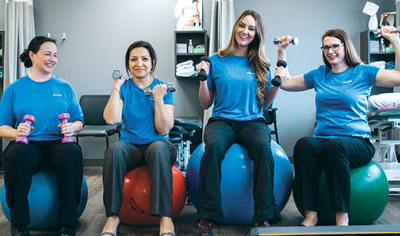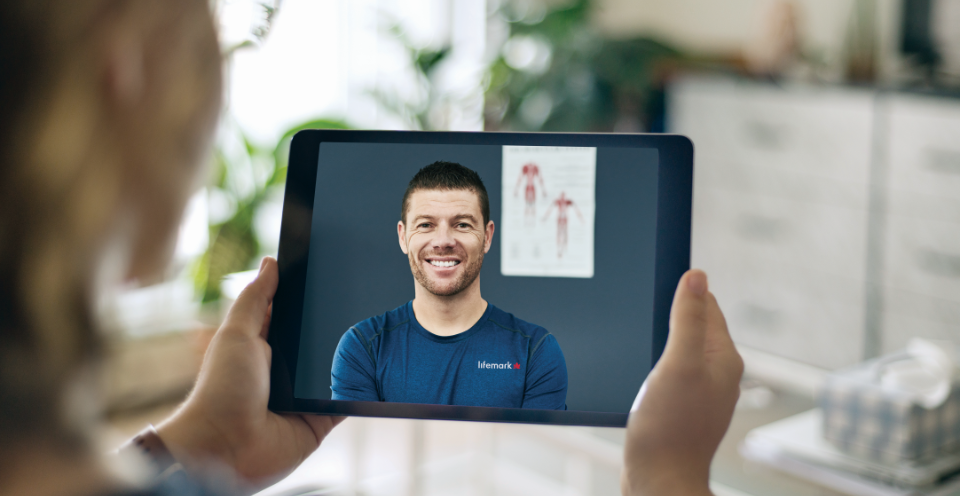Address:
Phone: 613-455-0260
Fax: 613-455-0261
We are offering a variety of virtual care services. Call our clinic to learn more or to book an appointment.
Hours of operation
- Mon:8:00am-4:00pm
- Tue:8:00am-9:00pm
- Wed:8:00am-4:00pm
- Thu:8:00am-4:00pm
- Fri:8:00am-4:00pm
- Sat:Closed
- Sun:Closed
Our parking lot is accessible off Carling Ave. travelling westbound. Turn right off Carling Ave, onto Hamilton Ave, and the parking lot will be on your right.
After you park, please pay for parking at the terminal inside the building entrance for the amount of time you will be in your appointment (you do NOT need to place your stub on your dashboard).
OC Transpo bus numbers 55 & 85 stop in front on the building.
Clinic information
Clinic information
Functional Restoration
Cupping Therapy
GLA:D
Intramuscular stimulation (IMS)
Manual Lymphatic Drainage
McKenzie Method
Pre/Post Natal Care
Temporomandibular Joint Rehabilitation
Comprehensive Cognitive Assessment (CBS)
Functional Dry Needling
Functional Testing
Work Conditioning/Hardening
Multiple Sclerosis Rehabilitation
Myofascial Release Therapy
Neurological Rehab
Psychotherapy
Shockwave Therapy
Stroke Rehabilitation
Traumatic Brain Injury Rehabilitation

Join our team
Apply nowOur team
Our team
-
PhysiotherapistType Physiotherapist Book onlineLanguages: English, Hindi, Gujarati, Marathi
-
PhysiotherapistType Physiotherapist Book onlineLanguages: English, Punjabi, Hindi
-
Occupational TherapistType Occupational Therapist Book onlineLanguages: English, French
-
Clinic DirectorType Occupational Therapist Book onlineLanguages: English
Common conditions we treat
Common conditions we treat
-
Arthritis
Arthritis is the classifcation of approximately 200 rheumatic diseases and conditions that affect joints, the tissues that surround the joint, and other connective tissue, causing pain, stiffness and mobility challenges. Assessment and treatment from a physiotherapist and chiropractor may help relieve the pain and stiffness.
-
Cancer-related fatigue
Cancer-related fatigue can occur both during and post-treatment. It can include brain fog or 'chemo brain', exhaustion and number of psycho-social symptoms such a depression, anxiety and sleeplessness. Cancer rehabilitation can help address the number of symptoms that can occur both during and post cancer treatment.
-
Carpal tunnel syndrome
Carpal tunnel syndrome is caused by pressure on the median nerve in the wrist and can result in numbness, tingling and pain in the affected hand and arm. It is often the result of repetitive use and strain. Physiotherapy can help alleviate some of the symptoms associated with carpal tunnel syndrome.
-
Concussion
A concussion is a brain injury that has physical symptoms such as headache, nausea, sensitivity to light and sound, and cognitive and emotional affects, including brain fog, lack of mental focus and fatigue. Concussion care services can help both speed recovery and prevent future injury. -
Dizziness and balance
Dizziness and balance issues can include vertigo, benign paroxysmal positional vertigo (BPPV), nausea, light-headedness, vision issues, motion sensitivity and sensitivity to crowds. They can severely impact quality of life if left untreated. Vestibular rehabilitation can help improve symptoms. -
Frozen shoulder
Frozen shoulder is a progressive condition that often starts with pain in the shoulder joint during basic movement. If the condition is left untreated, pain increases and mobility decreases. Physiotherapists can assess and develop a treatment plan.
-
Hand and wrist pain
Hand, fingers and wrist pain can include symptoms such as tingling, numbness and weakness. The most frequent causes are carpal tunnel syndrome, injury or overuse. An assessment and treatment protocol by a physiotherapist can help.
-
Headaches
Headaches can be caused by a variety of conditions and once assessed by a healthcare professional can be helped with physiotherapy treatment.
-
Herniated disc
A herniated disc refers to a problem with one of the rubbery cushions (disks) between the individual bones (vertebrae) that stack up to make your spine. Chiropractic services can help with the associated pain and discomfort.
-
Knee pain
Knee pain can be caused by bursitis, a torn tendon, ACL tear or injury and overuse. It is most frequently the result of osteoarthritis. Physiotherapy can help speed recovery.
-
Low back pain
Low back pain is one of the most common patient complaints. It can result from arthritis, spinal stenosis, scoliosis, sciatica, injury or overuse. An assessment from a physiotherapist or chiropractor can help provide a diagnosis and treatment plan.
-
BPPV
Benign paroxysmal positional vertigo or BPPV is the most common form of vertigo, and results in sharp and acute dizziness brought on by movement. It is caused by a dysfunction in the vestibular apparatus, a series of canals located inside the ear, which includes a canal of tiny crystals of calcium carbonate. BPPV occurs when some of the crystals escape from their normal chamber and get into one or more of the other ear canals. Vestibular rehab therapists are trained in treating the symptoms of BPPV.
-
Chronic pain
-
Learning disabilities
-
*Most pediatric and adult neurological conditions
-
Diabetic neuropathy
High blood sugar (glucose) from diabetes can damage nerves in your legs and feet. This can manifest itself as numbness in the legs and feet, and can be described as tingling, burning, cramping, sharp pain, hypersensitivity, muscle weakness, and a loss of balance and coordination. This condition can lead to serious foot concerns such as ulcers, infection, and bone and joint pain.
Visit one of our chiropodists or foot care nurses for a thorough diabetic neuropathy screening, including a Doppler evaluation. Treatments and interventions will be carefully customized for you based on your evaluation.
Coverage options
Virtual care
Virtual Care
 Virtual Care leverages video conference technology to provide services, including online physiotherapy, at a distance. Our video conference platform, built for healthcare professionals, allows you to consult a Lifemark clinician in the comfort of your own home.
Virtual Care leverages video conference technology to provide services, including online physiotherapy, at a distance. Our video conference platform, built for healthcare professionals, allows you to consult a Lifemark clinician in the comfort of your own home.
A clinician can assess or treat you, evaluate your range of motion, recommend exercises, give you advice on pain and pain management and much more.
Services from our specialty programs, such as pelvic health or concussion care, are also available through Virtual Care.
Secure, convenient online services
Virtual Care uses video conference technology to provide services at a distance that are private, secure and easy to use while giving you more flexibility by reducing travel time.
By removing accessibility and mobility barriers, Virtual Care ensures you can receive the care you need. Your privacy is protected through robust policies and safeguards and our clinicians are required to meet the same regulatory and legislative requirements and adhere to their respective Standards of Practice and Code of Conduct as they do for in-person services.
How it works
Before your appointment, you will receive a link to an online appointment session by email or text message. This link will take you to a video conference platform that will allow you to connect with your clinician and discuss your condition with them in real time.
You may be required to review and complete documentation before your appointment, which will be sent to you ahead of time.
For more information about our Virtual Care service, click the button below.













